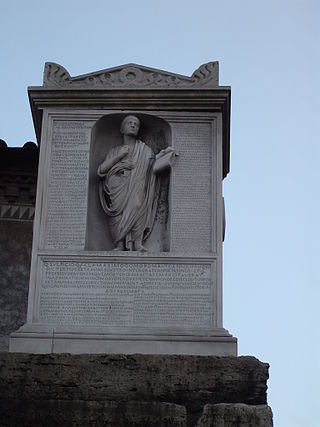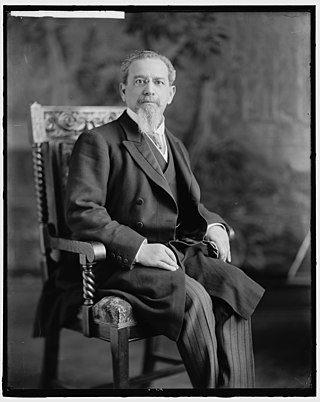Related Research Articles

Gaius Valerius Catullus, known as Catullus, was a Latin neoteric poet of the late Roman Republic. His surviving works remain widely read due to their popularity as teaching tools and because of their personal or sexually explicit themes.
Dactylic hexameter is a form of meter or rhythmic scheme frequently used in Ancient Greek and Latin poetry. The scheme of the hexameter is usually as follows :
The elegiac couplet is a poetic form used by Greek lyric poets for a variety of themes usually of smaller scale than the epic. Roman poets, particularly Catullus, Propertius, Tibullus, and Ovid, adopted the same form in Latin many years later. As with the English heroic couplet, each pair of lines usually makes sense on its own, while forming part of a larger work.

An epigram is a brief, interesting, memorable, sometimes surprising or satirical statement. The word derives from the Greek ἐπίγραμμα. This literary device has been practiced for over two millennia.
In poetry, a hendecasyllable is a line of eleven syllables. The term may refer to several different poetic meters, the older of which are quantitative and used chiefly in classical poetry, and the newer of which are syllabic or accentual-syllabic and used in medieval and modern poetry.
In poetry, metre or meter is the basic rhythmic structure of a verse or lines in verse. Many traditional verse forms prescribe a specific verse metre, or a certain set of metres alternating in a particular order. The study and the actual use of metres and forms of versification are both known as prosody.

Cornelius Nepos was a Roman biographer. He was born at Hostilia, a village in Cisalpine Gaul not far from Verona.
The adjective elegiac has two possible meanings. First, it can refer to something of, relating to, or involving, an elegy or something that expresses similar mournfulness or sorrow. Second, it can refer more specifically to poetry composed in the form of elegiac couplets.

The history of Latin poetry can be understood as the adaptation of Greek models. The verse comedies of Plautus, the earliest surviving examples of Latin literature, are estimated to have been composed around 205–184 BC.
Ibis is a curse poem by the Roman poet Ovid, written during his years in exile across the Black Sea for an offense against Augustus. It is "a stream of violent but extremely learned abuse," modeled on a lost poem of the same title by the Greek Alexandrian poet Callimachus.
A catalectic line is a metrically incomplete line of verse, lacking a syllable at the end or ending with an incomplete foot. One form of catalexis is headlessness, where the unstressed syllable is dropped from the beginning of the line.
Invective is abusive, or insulting language used to express blame or censure; or, a form of rude expression or discourse intended to offend or hurt; vituperation, or deeply seated ill will, vitriol. The Latin adjective invectivus means 'scolding.'
Catullus 16 or Carmen 16 is a poem by Gaius Valerius Catullus. The poem, written in a hendecasyllabic (11-syllable) meter, was considered to be so sexually explicit following its rediscovery in the following centuries that a full English translation was not published until the 20th century. The first line, Pēdīcābo ego vōs et irrumābō, sometimes used as a title, has been called "one of the filthiest expressions ever written in Latin—or in any other language".

Decimus Junius Juvenalis, known in English as Juvenal, was a Roman poet active in the late first and early second century AD. He is the author of the collection of satirical poems known as the Satires. The details of Juvenal's life are unclear, although references within his text to known persons of the late first and early second centuries AD fix his earliest date of composition. One recent scholar argues that his first book was published in 100 or 101. A reference to a political figure dates his fifth and final surviving book to sometime after 127.

In classical studies the term epyllion refers to a comparatively short narrative poem that shows formal affinities with epic, but betrays a preoccupation with themes and poetic techniques that are not generally or, at least, primarily characteristic of epic proper.

Joaquín Demetrio Casasús, a Mexican economist, lawyer, banker, politician, diplomat and writer who served on two occasions as Ambassador of Mexico to the United States.

Iambus or iambic poetry was a genre of ancient Greek poetry that included but was not restricted to the iambic meter and whose origins modern scholars have traced to the cults of Demeter and Dionysus. The genre featured insulting and obscene language and sometimes it is referred to as "blame poetry". For Alexandrian editors, however, iambus signified any poetry of an informal kind that was intended to entertain, and it seems to have been performed on similar occasions as elegy even though lacking elegy's decorum. The Archaic Greek poets Archilochus, Semonides and Hipponax were among the most famous of its early exponents. The Alexandrian poet Callimachus composed "iambic" poems against contemporary scholars, which were collected in an edition of about a thousand lines, of which fragments of thirteen poems survive. He in turn influenced Roman poets such as Catullus, who composed satirical epigrams that popularized Hipponax's choliamb. Horace's Epodes on the other hand were mainly imitations of Archilochus and, as with the Greek poet, his invectives took the forms both of private revenge and denunciation of social offenders.
Latin prosody is the study of Latin poetry and its laws of meter. The following article provides an overview of those laws as practised by Latin poets in the late Roman Republic and early Roman Empire, with verses by Catullus, Horace, Virgil and Ovid as models. Except for the early Saturnian poetry, which may have been accentual, Latin poets borrowed all their verse forms from the Greeks, despite significant differences between the two languages.
References
- ↑ Gamo, J.M.A. (2004). Cayo Valerio Catulo: poesías completas. Cayo Valerio Catulo: poesías completas (in Spanish). Ed. Aache. p. 168. ISBN 978-84-96236-15-8 . Retrieved 2022-04-27.